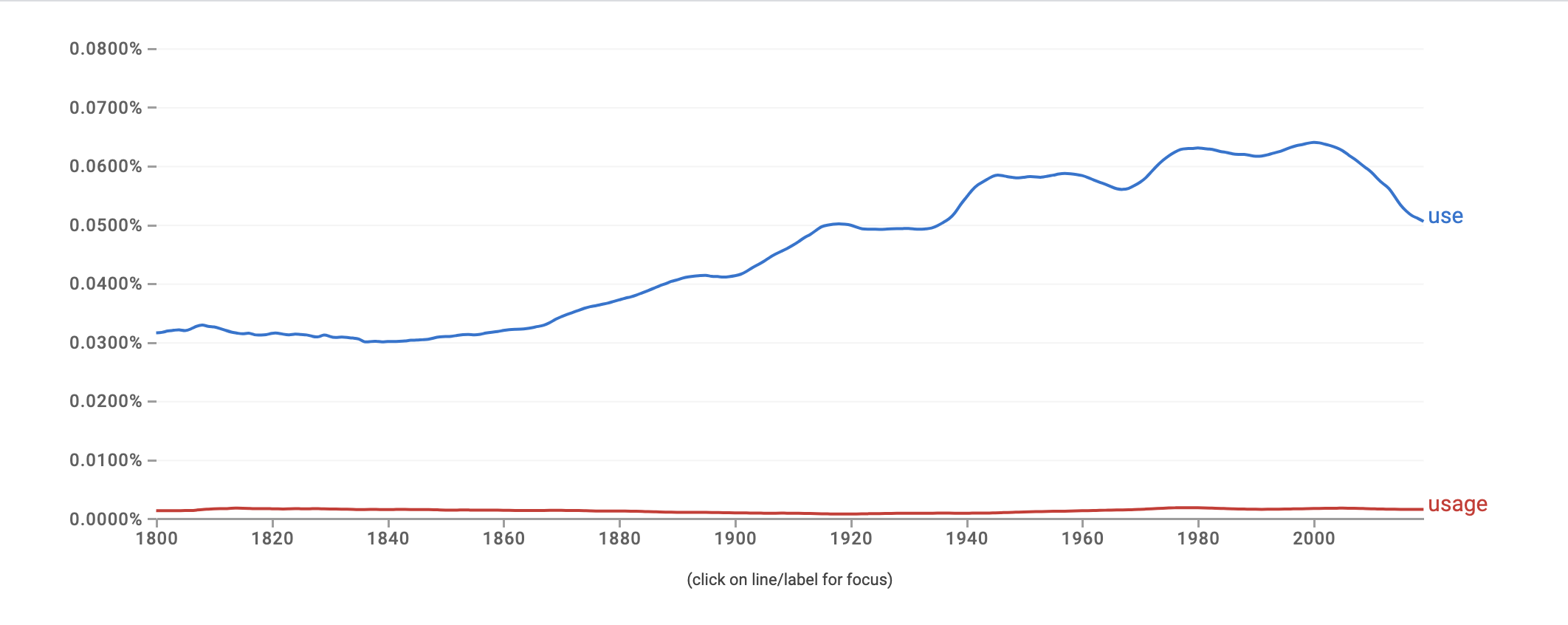- As a noun, "use" refers to the act of employing or applying something for a particular purpose. It can also indicate the state of being used or the utilization of something.
- As a verb, "use" means to employ or make use of something for a specific purpose or function. It involves applying an item or a skill for a particular end.
- "Usage" is a noun that refers to the manner or way in which something is used or employed. It can also denote the customary or established practice of using something, as well as the extent or degree of use.
⚡ The usage of renewable energy sources has increased significantly as people become more environmentally conscious.

When to use "use" and "usage"
"Use" and "usage" are used in different contexts:
Use
- Noun: Employ "use" when referring to the act of employing or applying something for a specific purpose or the state of being used.
Example: The use of technology has revolutionized communication.
- Verb: Use "use" when indicating the action of employing or applying something for a particular purpose.
Example: Can I use your pen to take notes?
Usage
- Use "usage" when referring to the manner or way in which something is used, or the customary or established practice.
Example: The proper usage of grammar enhances the clarity of writing.
- Also, use "usage" when indicating the extent or degree of use.
Example: The high usage of smartphones is a common phenomenon in today's society.
"Use" refers to the act of employing something, while "usage" pertains to the accepted or customary way something is used. Think of "use" as the action and "usage" as the customary practice. Connecting "use" to action and "usage" to customary patterns aids in differentiation.
The use of "use" and "usage" over time
Examining the graph below, we can see that there is a huge gap in how frequently "use" and "usage" occur. "Use" is more popular than usage.

Examples sentences for "use"
- Sally decided to use her artistic skills to create a beautiful mural on the classroom wall.
- Please use caution when handling the laboratory equipment to ensure safety.
- The chef recommended the use of fresh herbs to enhance the flavor of the dish.
- Students are encouraged to use the library resources for research and study.
- The company implemented the use of new software to streamline its operations.
Examples from the web
"We will use the information you have provided to us for the purposes of contacting you with information relating to Guardian Masterclasses and to conduct analysis for the purposes of providing future Guardian Masterclasses." - The Guardian
"Two were given a gel containing PRO 2000 (in different concentrations for each group), along with advice about how to use it, a regular supply of condoms and counselling on safe sexual practice and sexual health." - The Economist
Example sentences for "usage"
- The teacher emphasized proper language usage to enhance the students' writing skills.
- The dictionary provides examples of word usage in different contexts to aid understanding.
- The excessive usage of water during the drought raised concerns about conservation.
- Text messaging has become a common form of communication with widespread usage of smartphones.
- Efficient usage of time is crucial for productivity in a fast-paced work environment.
Examples from the web
"Our mobile usage has doubled in the past year, so it's definitely a priority for us." - The Guardian
"We have implemented pan-African human rights activism at the grassroots by optimising usage of our social media networks." - The Guardian
FAQs
What is better: use or usage?
"Use" is preferable when focusing on the action or application of something specific. "Usage" is more suitable when emphasizing the manner, customary practice, or extent of use. Choose based on whether you're highlighting the action or the broader context of application.
What is the meaning of syntax and usage?
"Syntax" refers to the arrangement of words and phrases to create well-formed sentences in a language. "Usage" pertains to the manner or way in which words and expressions are used within a language, encompassing grammatical correctness and common linguistic practices.
Summary
In conclusion, while "use" focuses on the act or application of something specific, "usage" delves into the broader context, emphasizing the manner, customary practices, or extent of application. The choice depends on whether one wishes to highlight the action or the comprehensive nature of application.

Want to sound like a native speaker?
Engram’s AI-powered grammar checker makes your English sound like a native speaker’s, suggesting natural English expressions on top of fixing grammar, spelling, punctuation, word order, and vocabulary.

References:















